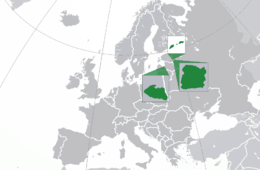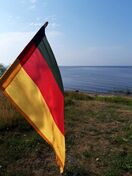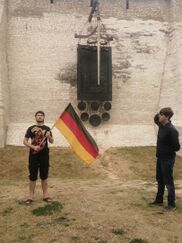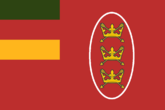Holy Esgeldian Tsardom
Esgeldia | |
|---|---|
Flag
Coat of arms
| |
| Motto: Contra omnes res "Lapaugi érti" | |
 | |
| Capital | Arvelkad |
| Largest city | Melkavd, Lappk'enger, Imanta |
| Official languages | Esgeldian, Latvian and Russian[1] |
| Demonym(s) | Esgeldian |
| Government | dualistic monarchy |
• Tsar | Arwelk I Warnargad |
• Chancellor | Dmitry Chodźko |
• Lord-Speaker | Astrid Luxemburg |
| Legislature | Arvojgeld of Esgeldia |
| Establishment | November 2016 (as Kingdom of Enderyard) July 2017 (as Talab republic) 5 December 2017 (as Enderwald Republic) 1 January 2021 (as Holy Esgeldian Tsardom) |
| Time zone | UTC+2; UTC+3 |
The Hallowed Realm of Esgeldians (Russian: Царство Эсгельдии; Esgeldian: Asgély Denkisba) is a micronation in Pskov Oblast, Russia and Riga, Latvia, created and headed by Arwelk Warnargad.
Esgeldia is a dualistic monarchy claiming succession from the Pskov Principality that existed from 1014 to 1510.
History
Protoesgeldian period (2016-2017)

The first attempts to create his own micronation were made by Arwelk in November 2016 under the impression of the first contacts with the micronational community "@_@" (through the mediation of the current president of Witoldia Vitold Chaban). As a result, the Kingdom of Lettia was founded in Riga's Vidzemes Priekšpilsēta district (approximately the current territories of the Kingdom of Jeglaime), which, alas, lasted no more than two days.
The next two attempts to form protoesgeldian statehood took place in the spring and summer of 2017 in a "rolenation" field - the Kingdom of Enderyard and the Talab Republic, whose period of existence also did not amount to a long time.
Despite all the amateurishness of the first year of Arvelk Varnargad's activity (given his 13-year age), the most notable diplomatic successes are the first contacts with Andilonia, the East Moscow Soviet Republic and the Volgodonsk People's Republic. However, despite the fact that these polities have not existed for almost five years now, Arvelk was able to establish friendly relations with their founders, who currently lead the developed Russian micronations (Alsar, Zelesia and Karfiaria), being loyal and reliable esgeldian allies for many years.
During the spring-summer of 2017, Enderyard and Talab managed to participate in the activities of such dubious organizations as the Union of Unrecognized Micronations and in the First Micronational International already mentioned above, but this did not give a significant impetus to the development of protoesgeldian statehood again. Also during this period, sketches of the first esgeldian currency were made in the person of the Talab ruble (extremely terrible quality), which have not survived to the present. However, subsequent events predetermined the final formation of the esgeldian statehood at a qualitatively new level.
Enderwald Era (2017-2019)
On December 5, 2017, the Republic of Enderwald was proclaimed as the legal successor of the Talab Republic. The next day, the Constituent Assembly adopted the Constitution. Within two months, Enderwald carried out the necessary reforms and established contact with the developing micronations of that time (Snelandia, Estasia, etc.). During the Loneyard February crisis, the Enderwald government supported the rebels and joined the "Micronational Anti-Fascist Coalition".
One of the first international actions was the informal participation of Enderwald in cooperation with the Hetmanate of Lesser Commarenthia in organizing a coup d'etat in the Gorland Federation and the establishment of the Gorland kingdom in autumn-winter 2017. During this action, Arvelk Varnargad met Alexey Inshakov, whose friendship led to the establishment of diplomatic relations between Enderwald and Estasia — the first international recognition of the Enderwald by a more developed micronation.
Acquaintance with Alexey Inshakov opened up new opportunities for the Enderwald leadership in the conditions of instability in the "second world" of the Russian-speaking micronational community in the spring-summer of 2018. Enderwald supported the progressive forces, Enderwald President Arvelk Varnargad joined the informal Cobra bloc and later became one of its de facto leaders, and in December 2018 became one of the three participants of the Skavenlard.
Enderwald's participation in Cobra activities led to the final formation of the Enderwald state, at that time widely recognized by the Russian micronational community. At the same time, attempts were made to create their own language (on a balto-germanic basis) — subsequently, such experiments led to the formation of the esgeldian ideality and the esgeldian state that has existed since the end of October 2019.
During a long debate about further state development, on May 31, 2019, the Enderwald was renamed the Republic of Evelia by a decision of the National Assembly. In the fall of 2019, Evelia and the Kommarenze Tsardom formed a short-term confederation - the Fajradenhaļ Commonwealth, dissolved on November 4. Shortly before that, on October 31, 2019, the final name was chosen for Evelia: Esgeldia, and the national flag acquired such recognizable yellow-red-green colors.
Esgeldian Era (2019-present)

The formation of the Esgeldian Republic opened up new opportunities for the country's leadership to develop its own culture instead of the former "flow of bureaucracy". The fruits of the new state policy can be seen in the form of the existing Esgeldian language with minor changes to the present time. The former eagle, inspired by german heraldry, has also become a thing of the past - the phoenix bird has become a new symbol of the Esgeldian nation, rising from the ashes over and over again (which obviously has a very strong allusion to Esgeldia's past). From autumn 2019 to summer 2020, the Esgeldian government established ties with countries with which relations were previously extremely cold (Loneyard, Skuliya), and also strengthened the old ones (Konakia).

The same summer of 2020 saw an important event for the foreign policy vector of the Esgeldia — the return of old allies was warmly welcomed. The formation of the Orange Republic (later Witoldia) under the leadership of Vitold Chaban, who later restored the more ancient (since 2011) Witoldian statehood and introduced Arvelk Varnargad to the micronational world in 2016, inspired the Esgeldian leadership with hope and confidence in the future despite the general decline in micronational activity at that time.
The official restoration of contacts with Witoldia took place since the signing of the agreement on mutual recognition and establishment of diplomatic relations on July 6, 2020, which is still in force.
On July 10, 2020, Arwelk Warnargad's third term of office ended - Ivan Ivanov became the new (and last) president of the country after Kuzmin's refusal to run for president on July 8. After retiring from politics, the ex-president returned to his writing activities within the framework of the Esgeldian culture.
The new year 2021 has become a turning point in the history of Esgeldia both in terms of internal reform of the unshakable foundations of Esgeldian statehood (abandoning the republican form of government that has existed since 2016) and in the foreign policy course. During December 2020, President Ivan Ivanov resigned, while the leadership of the country passed into the hands of the People's League of Esgeldia led by ex-President Arwelk Warnargad. Already on January 1, 2021, the formation of the Holy Esgeldian Tsardom was announced, while the former president ascended the throne as Arwelk I, Tsar of Esgeldia from the Warnargad dynasty.
In parallel, on the eve of the New Year holidays, together with the leadership of Witoldia, the charter of the first intermicronational organization within the framework of the "Cobra-world", promoting the development of closer relations between Russian micronations on a democratic basis, the League of Independent States, was developed. Currently, about 26 micronations participate in the activities of various LNG institutes.
During 2021, the esgeldian peacekeeping contingent under the auspices of the League participated in the resolution of the largest micronational conflicts - the crisis of statehood in Portasia and the restoration of the micronational order in the Moscow region together with Teweria.


In July 2021, the cooperation of the Esgeldian monarchy with the independent Izborsk squad (the club of historical reconstruction "Allod", currently - medieval battle club "Russian Fight Team") was established in matters of defense, thanks to which the command of the Heavenly Royal Army was able to call for the help of a mercenary army in the event of a threat to the territorial integrity of Esgeldia. Named after the place where the international act was signed, Dovmont's Treaty became the first major political event within the Pskov Krom since the liquidation of the "veche" republic and the removal of the Veche bell after 1510.
On November 22, 2021, three and a half years after establishing contacts with the leadership of Konakia and Laugrasia, the first real meeting with Alexey Inshakov and Ivan Ivanov was held in Moscow, known as the Fourth Micronational Congress. The leaders of the three states discussed issues of further development of the Russian micronational community, in parallel, measures were developed to counteract criminal groups in the Moscow region, and the statesmen themselves exchanged credentials.
Internal structure
According to the Constitution, the Holy Esgeldian Tsardom is a federal meritocratic-aesthetic monarchy, where state power and sovereignty come from the people and God under the guardianship of the monarch.
The highest value of Esgeldia is the comprehensive development and well-being of its subjects from among the Esgeldian, Slavic and Baltic peoples. The official languages of Esgeldia are equally recognized as Esgeldian and Russian, which are simultaneously the languages of official record keeping. Latvian language in the western territories of the country has the status of a regional language and is equally used on a par with the state language.
Holy Esgeldian Tsardom undertakes to support in every possible way all spiritual institutions of any Esgeldian religions, thereby forming a smooth transition and symbiosis between the divine and earthly kingdom of Esgeldian people. In Esgeldia, the status of a "society of spiritual well-being" is held by the Esgeldian Apostolic Church (old-ortodox), Old Orthodox Pomorian's Church, a number of parishes of the Russian ortodox and Tajrigaldar (Esgeldian paganism).
Legislative power in Esgeldia is exercised by the Chamber of Lords (de-facto government) and the Arvojgeld (parliament), executive power is exercised by the esgeldian monarch.
Administrative structure
Holy Esgeldian Tsardom consists of four historical kingdoms (Lappeld, Talbe, Gleim and Fenkblame) and one principality (Melkjavge), as well as eleven fief townships. While Fenckblame is the personal domain of Tsar Arvelk I Varnargad, the status of the other four monarchies is not defined.
The Chamber of Lords and Arvojgeld are making every effort to find worthy people who are ready to occupy empty royal thrones. The issue of the vacant princely throne of Melkavge is particularly acute - being the de jure official successor of the Pskov Principality (along with Esgeldia as a whole), the Melkavge throne has remained vacant since 1399.
Armed Forces

The Royal Heavenly Army of Esgeldia includes the Royal Land Forces, Royal Air Force (practically non-existing) and the Royal Naval Forces. The latter, existing as a marine infantry unit, exercise visual control over the two largest rivers of Esgeldia, Pskova and Daugava. Given that the latter is the actual border of the Holy Esgeldian Tsardom and the Republic of Latvia, the Navy is responsible for timely patrolling the western outposts of the Kingdom.
Army has participated and is taking part in many micronational conflicts around the globe, defending the interests of the Esgeldian monarchy inside and outside the country, as well as providing any necessary assistance to the good friends of the Esgeldian people among friendly states (mainly among the countries participating in the League of Independent States).
Foreign policy
Throughout its republican period of history, Esgeldia was one of the countries of the unspoken "Cobra" alliance, following the path of progressive kobrist ideology. Esgeldian foreign policy was aimed at strengthening the position of cobrism in the micronational and rolenational environment: support for russophile, anti-globalist, Eurasian and Orthodox movements.
After a long-term split in Skavenlard in early 2020 (internal organizational conflict between Arwelk Warnargad and Alexey Inshakov) Esgeldia conducts its own foreign policy based on cooperation with most states of the Russian-speaking micronational world. With the formation of the League of Independent States in the winter of 2021, the Esgeldian government stands firm in the development of democracy and respect for human rights in the micronational community. Esgeldian Tsardom, through peacekeeping actions, is actively fighting criminal pseudo-micronational politicians, whose actions disgrace the very status of "micronation" and are aimed at bringing confusion and chaos to the controlled regions.
A good example in this case is the joint operation of the Special Service of State Police of Esgeldia and the Royal Land Forces under the leadership of Arwelk I, which took place from 24 to 25 November 2021. The criminal gangster nicknames of Ramland and Aniota for the first time received a worthy rebuff from the Esgeldia in Pushkino District of the Moscow region. The territories of the Principality of Teweria occupied by them earlier were liberated in the shortest possible time, and order of law were restored in the territories.
Since December 2021, Esgeldia, together with its important ally in the Baltic, Waldreich, has been actively promoting the establishment of diplomatic and partner relations between the micronations and organizations of the Western and Eastern world.
The first step towards this was the round of negotiations with the Baltic micronations, which took place from December 21 to 31 between Esgeldia and Waldreich on the one hand and Western Latgale, Revalia, Slitronia and Dultoria on the other.
Having gone through a number of controversial issues, including claims of the revalian representatives related to the "frivolity" of the Russian micronational movement, fortunately quickly overcome, representatives of five micronations of Latvia and Estonia in the year of the first anniversary of the founding of their Russian-speaking "big brother" in the face of the League of Independent States, on December 31, 2021 adopted the Charter of the Baltic Union - the charter of the first international organization in the Baltic and North-West of Russia, contributing to the consolidation of cultural, economic and political unity of the signatory countries.
In addition, through the efforts of the Foreign Ministry of Esgeldia, negotiations are underway with micronations from the United Kingdom, USA and Malta on the formation of another international organization that will simplify the dialogue between Russian-speaking and English-speaking micronations around the globe. In cooperation with Jack Allensby, President of the Republic of Gunakia (located in Warminster, Wiltshire, UK), the concept of the Nansen Commonwealth is being actively worked out, in which, after signing the official Charter, a number of both Russian-speaking and English-speaking micronations gave preliminary consent to participate. It is expected that this organization will begin its activities at the end of January 2022.
Ironically, even in the expanses of the English-language "Discord", Russian-speaking micronations were discovered by the esgeldian diplomats. So, since about December 27, Esgeldia has established informal contacts with the Grand Duchy of Belakray (on the territory of the Zhytomyr oblast', Ukraine) and its Grand Prince Andrei-Ludwig Hubert. Negotiations with Prince Andrei have been conducted on a friendly note from the very beginning, and it is quite possible that in the second half of January 2022 an agreement on mutual recognition and establishment of diplomatic relations will be signed between the two countries.
On January 4, 2022, Esgeldia joined the Alliance of Micronations (the first international Western organization not created with the participation of Esgeld diplomats), and on January 8 joined the ranks of the participating countries of the Organization of European Micronations, simultaneously producing an updated logo for them.
In general, at the time of January 2022, Esgeldia has the status of a founding country within the framework of the Baltic Union, the Nansen Commonwealth, and also has full membership in the aforementioned Alliance of Micronations and the Organization of European Micronations.
Culture

The activity of Arwelk Warnargad since 2019 has not been in vain, thanks to which all people have access to most of the achievements of the esgeldian culture. First of all, this concerns the Esgeldian language, the dictionary of which (Esgeldian-Russian) has been freely available since the winter of 2020, as well as the chronology. Most international treaties are drawn up in bilingual format as far as possible and published in the Esgeldian and Russian languages on the official resources of the country.
There is also a whole media resource dedicated to literature. So, anyone can visit and get acquainted with the fantasy world of Lajdure, dedicated to the development of Esgeldia as an alternative country in an alternative reality, similar in culture to Earth. In addition to Esgeldia itself, many other cultures are actively being worked out in the world, and the geopolitical interaction of countries existing in this world is described in the form of brief "television essays" published in the official Lajdure group on the VKontakte social network.
Esgeldian paganism

Heavenly faith (Tajrigaldar) is a secondary religion of Esgeldia, which emerged from the literary world of Laidure as a monument of esgeldian culture. It includes an extensive pagan pantheon, founded under the impression of traditional Baltic beliefs before 1411 and Arvelk Varnargad own developments.
Tairigaldar includes the division into higher gods (Heavenly Archons, among them - Tajrigal, the lady of the heavenly forces, Lenarvia, mistress of the sea, Merdal - the patroness of family peace and well-being), natural deities (esgeldian animism, Argham - the patron of wars, Vengelt - the conductor of souls on deathbed, Mergantia - the goddess of love and the patroness of marriage), beings of the Middle World (otherworldly entities, like Alkerda - night keeper of property, Opkel - wood-goblin, Helderma - the spirit of a wandering old woman) and creatures of Darkness (the souls of the dead, who after death became analogs of demons or evil spirits who want a person to die).
For obvious reasons, esgeldian paganism is not a strictly formalized religion and is cultivated in the narrow literary circle of Esgeldia - articles about it have been published since the summer of 2020.
Esgeldian State Historical Museum

On December 1, 2021, State Historical Museum (Esg. Asgélyden irmekden pelardarden isgaudran) was opened in Esgeldia, which includes the Fund of Numismatics, Bonistics and Philately (Esg. Ķald péwdener, hörbegdere ar iwaganer), as well as the Fund of Literature and Monuments of Art.

At the moment, the ESHM Numismatic Fund contains 2/3 coins from the private collection of Tsar Arvelk I, collected since 2011 and represented by coins and banknotes of both existing countries of the world (Germany, France, Great Britain, USA, Latvia, Lithuania, Estonia, Poland, etc.) and historical states (East Germany, British Hong Kong, French State, Hungarian People Republic, Polish People Republic, SFR Yugoslavia, etc.). According to preliminary estimates, the total number of coins managed by the fund exceeds 200 pieces, and the Ministry of Public Education of Esgeldia plans to replenish the collection as far as its financial capabilities.
The museum, despite its state status, operates free of charge and any esgeldian citizen can get acquainted with its contents.
Along with the Numismatic Fund, it is planned to organize an exposition of the Literature and Art Monuments Fund, which will include all historical artifacts that have made a significant contribution to the development of the esgeldian statehood and the esgeldian worldview.
Mass media


Taking into account the geographical location near Latvia and Russia, the corresponding largest radio and TV channels are available for viewing on the territory of Esgeldia (within the framework of the Broadcasting Law). Their list includes: LTV1, LTV7, LNT, Riga TV24, Latvijas Radio 1-2, Radio Skonto (in Latvia), as well as Radio Russia and the corresponding TV channels that are part of the first multiplex of digital television in Russia.
Nevertheless, in the early twenties, the government of Esgeldia made attempts to launch its own television and radio broadcasting within the framework of the established broadcasting company "ÉTÉ", whose news is published in the official media resources of Esgeldia in VKontakte in the form of essays. The full launch of broadcasting is planned for 2022-2025.
Transport
On the territory of Esgeldia there are automobile, bus, trolleybus, tram (the last two exclusively in the Kingdom of Eglame) and railway communication connecting the cities of Imanta and Arvelkad with Latvia and Russia, respectively.
Directly on the territory of Esgeldia are the railway platforms Lyubyatovo and 262 kilometer of the Oktyabrskaya Railway, which were in the department of the Ministry of Railways of the Enderwald until 2019. With the formation of the Holy Tsardom, this body of the central administration of railways was abolished and was not restored, since the Arvojgeld of Esgeldia decided to keep the track facilities on its territory in use by Latvian and Russian railways, respectively. Thanks to the Russian federal highway R-23 "Pskov", which runs on the territory of the Keb' and Vandian volosts, Esgeldia has a direct connection with the city of federal significance of the Russian Federation St. Petersburg.
References
- ↑ The language of the majority of population

